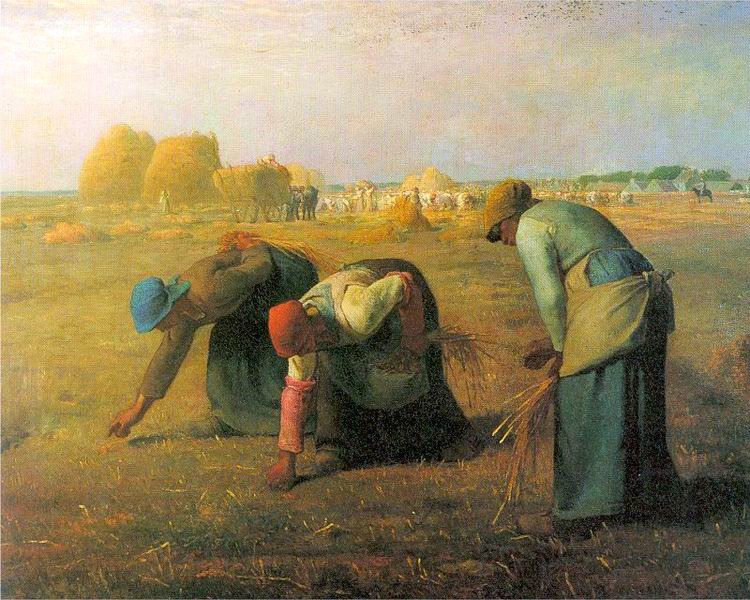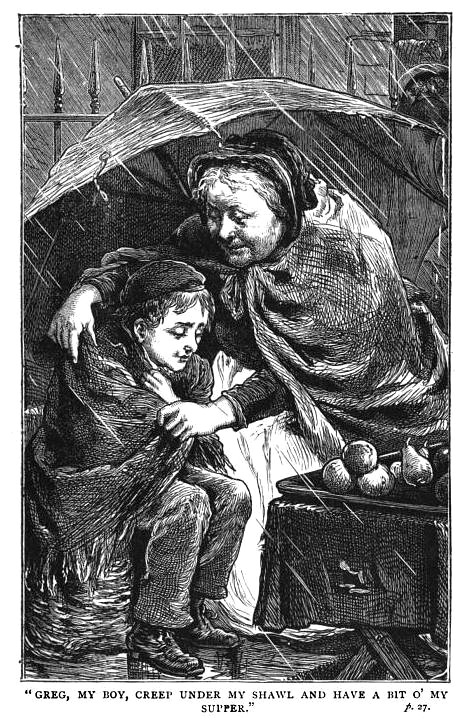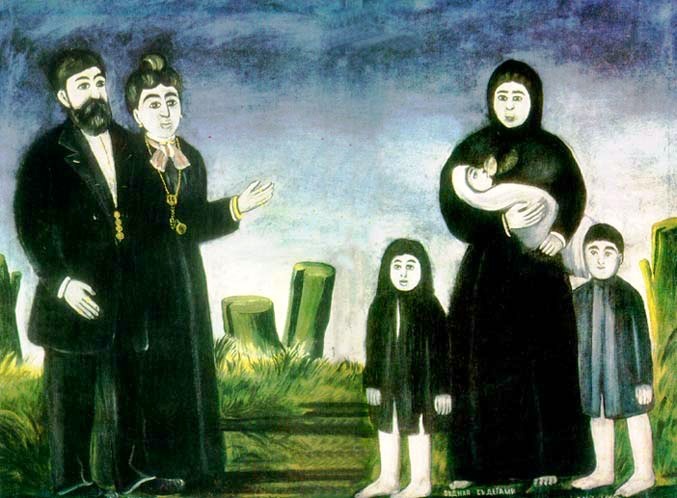The politics of leftovers smoothed relations between rich and poor for centuries. When it was scrapped, things got crummy.
In Chile I once ate a bull's testicle. My family and I were staying in Santiago when our second night there we received a dinner invitation from a colleague of my father's, a stout, mirthful industrial engineer who was reportedly a crony of the dictator, Augusto Pinochet. The meal consisted of quail eggs and arugula for the adults, and for the children a dish that I took to be baked apples dusted with cinnamon
My culinary misadventures in Chile didn't end with that bit of bull's bull-hood. Everywhere I went it seemed bad food lurked. Chicken sickly-white and as cold as a stone plucked from a stream; greasy potatoes reeking of spoiled fish; stale cake flecked with black bits of lord-knows-what; hot dogs entombed in skinned-over mayonnaise; cherries proffered by an aged, tubercular German hotelier; mysterious meat harboring equally mysterious parasites--such were the dishes served me at various times during that month-long trip. I remember feeling grateful for the bomb scare that kept us confined to the Santiago Sheraton, where sandwiches, pizza and other foods familiar to an eight-year-old girl populated the room-service menu.
Yet even meals taken at our hotel presented problems. Our final night in Santiago I recall was sultry, stifling even. My father nonetheless suggested that we dine al fresco. We sat on the hotel veranda, sipping pop and people-watching. Folks from all walks of life passed us: businessmen and -women in smart office attire, poorer sorts in traditional woolens, children in patchwork. These latter attracted my attention as much for their apparent age, which I determined to be close to mine, as for the fact that they roamed in groups of seven or so.
I had noticed them earlier in our trip. They'd follow my family as we went sightseeing or window-shopping. Lacking chicles or trinkets to sell, they simply begged. We went out of our way to avoid them.
The presence of the veranda railing emboldened me to study these children
And eat it they did. We left the veranda for our rooms. As we entered the lobby, I looked back to see two boys hop the railing, snatch the scraps, and run off before the waitress returned to clear our table.
To see these children wolf down my leavings was to feel as though an intimacy distasteful and disquieting had been thrust upon me, such as when you're obliged to borrow a friend's bathing suit or commanded to kiss a cousin. Those kids, so unlike me, I considered guilty of a gross violation--though of what, exactly, I could not say. All I knew was that those pulped bits of burger and fries I left to fester in the evening heat were somehow still mine, despite the fact I had refused them.
* * *
In precapitalist times, when the rich and poor mingled more intimately than they would later in history, the sight of an urchin devouring a rich man's scraps elicited quite a different response than that of my vacationing eight-year-old self. An individual's fortune was believed to reflect his attentiveness to the others' misfortune. Count Henry of Rothenburg and his wife, for instance, subscribed to this notion. When they took in a cheerful and generous eighteen-year-old cook, Notburga, they condoned her practice of donating the remains of the day's meals to the poor. Daily she doled out portions of the best bread, cheese, meat and wine the castle's kitchen had to offer, thereby winning the townsfolks' love and appreciation--and perhaps the peace, as well. Count Henry's demesne enjoyed great prosperity; to live under his mild yoke was to know security and contentment.
This peace, security and contentment ended with the succession of Count Henry's son. He and his parsimonious wife Ottilia commanded Notburga
The care that Count Henry, his wife, and the goodly Notburga showed the poor betokened a certain reciprocity at work in the pre-industrial world. "Under the economic conditions of early, natural agricultural economies, noble status is conferred, not just by wealth, but also by a hospitable and charitable manner of living," writes sociologist Max Weber. Wealth was considered neither a rational consequence of thrift and smart investment, nor evidence of some inborn excellence. Rather, it was regarded as status enjoyed at the sufferance of providence and was therefore subject to revocation. A sudden turn of Fortune's wheel and Dives became Lazarus; Lazarus, Dives. Giving charity appeared, then, the best hedge against divine whim. Far more than a source of rent or labor, the poor represented something like fortune insurance, and the largess shown them a premium payment on the policy.
As befitted agricultural economies, extending and respecting gleaning rights presented a ready way for the rich, whose wealth generally derived from land holdings, to tender this premium. Gleaning rights not only offered them convenience--nothing was required of them or their workers save that they refrain from harvesting a certain portion of their crops--it also carried the authority of Holy Writ. "When you reap the harvest of your land, you shall not reap to the very edges of your field, or gather the gleanings of your harvest," Levitican law stipulates: "you shall leave them for the poor and alien." More than simply a way of escaping divine wrath, gleaning customs afforded landowners an opportunity to display great magnanimity. To do so was to emulate the Old Testament
Subsequent eras would show the example of Boaz more an aspirational ideal
As late as the nineteenth century, denying the poor their rightful share, whether by hogging their trenchers or by prohibiting their gleaning, was regarded as tempting fate. In The Farmer's Calendar (1804), Arthur Young observes that the "custom of gleaning is universal, and very ancient." His country England presents a special case, however. There "the poor have no right to glean, but by permission of the farmer." Despite Young's admonition that "[t]he custom is so old and common that it is scarcely ever broken," and must therefore continue to be observed, by his time farming methods had improved to the point that the tradition of gleaning fell into crisis. Landowners came to adopt an increasingly hostile attitude toward it, and the poor came to realize fewer benefits from it. "With the introduction of large farming these customary rights were in danger," write John Lawrence Hammond and Barbara Bradby Hammond in The Village Labourer 1760-1832 (1920).
It was a nuisance for the farmer to have his fenced fields suddenly invaded by bands of women and children. The ears to be picked up were now few and far between, and there was a risk that the labourers, husbands and fathers of the gleaners, might wink at small thefts from the sheaves. Thus it was that customary rights, which had never been questioned before, and seemed to go back to the Bible itself, came to be the subject of dispute.
If advances in agriculture occurring in the late eighteenth century inspired less mindfulness with respect to obligations to the poor, industrial advances made a few decades later encouraged their complete forgetting. No longer an indemnity against misfortune or a "There but for the grace of God go I" memento, the poor became just so much human refuse. As such, they found no place in a society that increasingly valued speed and efficiency in all its forms--factories, railways, steamboats. Thomas Malthus, himself a wealthy clergyman, figured as a sort of Cassandra in this regard. His Essay on Population (1798) presents the poor not as people with definite claims on the rich, but as useless eaters who threaten to upset the entire social order should they increase "in a geometric ration," which is to say, in a manner all out of proportion with their "arithmetically" increasing provender. Better they should simply die, he reasoned, than live to pilfer from their betters.
This rupture between betters and their inferiors poet Charles Baudelaire documents in his 1869 prose poem, "The Eyes of the Poor," which depicts an encounter involving the poem's speaker, an unnamed woman accompanying him, and an impoverished family. "You want to know why I hate you today," the speaker tells the woman: "you are, I think, the most perfect example of feminine impenetrability that could possibly be found." He goes on to describe a day they had spent together, during which they had vowed to "think the same thoughts." A visit to a "new cafe" changes things. The speaker and the woman sit just outside it. "The cafe glittered," he recalls, and was "at the service of the gourmand." The "very gas-jet burned with the ardour of a beginner," illuminating the "blinding whiteness of the walls, the dazzling glass in the mirrors, the gilt of cornices and mouldings" and the illustrations of "ladies laughing at the falcons on their wrists ... nymphs and goddesses carrying fruits and pies and game on their heads ... Hebes and Ganymedes holding out at arm's-length little jars of bavaroise or parti-colored obelisks of mixed ices." In front of this monument to glorious excess stood "a man of about forty years of age, with a weary face and a greyish beard." In his arms he held a "child too weak to walk," and he grasped by the hand a little boy. All three, the speaker mentions, "were in rags."
At the cafe this family stared in admiration. Each pair of eyes expressed something different. The father's eyes proclaimed, "How beautiful! how beautiful! One would think that all the gold in this poor world had found its way to those walls." The boy's, "How beautiful! How beautiful! But it's a house which people like us cannot enter." The baby's, meanwhile, betrayed only "stupid and utter joy."
Deeply moved by "this family of eyes," the speaker turns to his companion. Keen to read his thoughts in her eyes, he meets disappointment. "I can't stand those people staring with eyes like saucers!," she complains. "Couldn't you tell the head waiter to send them away?"
"The Eyes of the Poor" ably demystifies the enchantments of a then-incipient consumerism. The cafe and its wares ask only that the onlooker think of them and the intimate exchange they promise her. She hands over money. In return she receives the objects she desires. The transaction is clean and efficient; an unaccountable, dispossessed other lays claim neither to the product nor the profit. Those who cannot afford to share in the fantasy have no right to exist. They should be sent away or, as Baudelaire in another prose poem
* * *
History's lessons are often told slant. Competing ideologies tend to reveal latent tendencies in each other. This was particularly true of mid-twentieth century U.S.–Soviet relations. It was Stalin who clearly defined the place of the poor in an industrialized world. His "Law of Spikelets" criminalized gleaning in order to protect state kolkhozes and cooperatives
Such sentences were also handed out in countries that presented themselves as the polar opposite of a planned economy. When Pinochet seized power in 1973, he set about systematically destroying his opponents. Thousands were killed, close to 80,000 interred, and 30,000 tortured, including women and children. These adversaries stood in the way of his regime's economic reforms. Enamored of free market-oriented libertarian policies, Pinochet's government eliminated tariffs, opened markets to global trade, curbed union power, privatized social security and hundreds of state-controlled agencies, and otherwise implemented measures intended to encourage foreign investment. The resulting "economic boom" experts dubbed "the miracle of Chile."
And a miracle it was--if only briefly
Perhaps they have. For though most do not see a United States as bloody-minded (yet), they do see a country grown contemptible of its downtrodden and dispossessed. A desire to knock down the poor, as is evident in recent discussions of dismantling the welfare state and imposing austerity measures, leads those who feel it to forget the age-old insight that fortune and misfortune remain inextricably linked. The simple truth borne out by reforms on both sides of the equator is that eventually almost everyone is reduced to fighting over scraps, while a tiny elite have themselves a ball.


